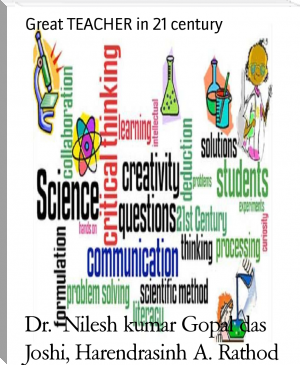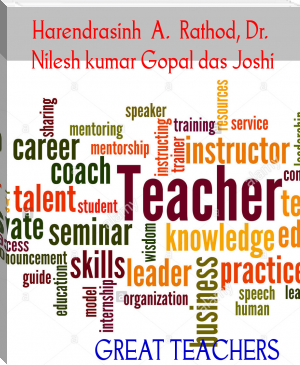Acharya Devo Bhav: by Dr. Nilesh Gopal das Joshi (best ereader for pdf and epub txt) 📖

- Author: Dr. Nilesh Gopal das Joshi
Book online «Acharya Devo Bhav: by Dr. Nilesh Gopal das Joshi (best ereader for pdf and epub txt) 📖». Author Dr. Nilesh Gopal das Joshi
Principals are often rated on how well the students at the school perform on particular standardized tests. They should be able to review test scores and work to make improvements. School principals need to be able to evaluate the overall learning process and make changes in order to improve it. For example, the principal of an elementary school might institute a reading buddy system so that emerging readers can develop their skills.
Rapid Decision-making SkillsSchool principals must be able to make sound decisions about urgent situations in a minimum amount of time. For example, a school principal might need to decide whether or not to close the building when the weather is unfavorable. They will also need to have strong decision-making skills for long-term concerns. A lot of factors may go into the long-term decisions, and a principal should feel comfortable with gathering input, evaluating it and making a decision that is best for the whole.
Problem-solving CapabilitiesAll kinds of problems come up in a school. From students who experience disciplinary issues to facilities management needs, a principal needs to be able to solve a wide variety of problems. The principal should be able to efficiently analyze the problem, develop an appropriate solution and implement it with the available resources. The principal should also be able to work with others in order to solve problems. For example, a school principal may need to work with the school’s police resource officer in order to handle disciplinary and criminal concerns.
Related Resource: 50 Most Affordable Online Master’s in Education Administration
Strong Interpersonal SkillsStrong interpersonal skills are also important characteristics of a school principal. A school principal has to be comfortable working with teachers, administrative staff, the school board, the state department of education, parents, students and the community. Within these groups, there may be people from a variety of cultural backgrounds who have different opinions on how the school should operate. The principal needs to take everyone’s input into account in order to establish positive working relationships.
People who have all five of these traits, as well as the necessary education, experience and passion for the job, will do well at being school principals. These qualities are good signs that a person is ready to handle this important and often stressful type of work. Keep in mind that these are not the only characteristics of a school principal, but they are essential to success at doing the job.
Chapter 11 TEN Traits of Successful School Leaders
10 Traits of Successful School Leaders
Educational leaders play a pivotal role in affecting the climate, attitude and reputation of their schools. They are the cornerstone on which learning communities function and grow. With successful school leadership, schools become effective incubators of learning, places where students are not only educated but challenged, nurtured and encouraged.
On the other hand, poor or absent school leadership can undermine the goals of an educational system. When schools lack a strong foundation and direction, learning is compromised, and students suffer. According to a Wallace Foundation study, “Leadership is second only to classroom instruction as an influence on student learning.”
The Makings of a Successful School Leader
But what makes a successful school leader? How do you become truly effective as a principal or in a leadership position? While there is no one solution to successful school leadership, there are certain strategies, skills, traits and beliefs that many of the most effective school leaders share.
The following traits are common among the most successful school leaders.
They Understand the Importance of Building CommunityEffective school leaders build and sustain reciprocal family and community partnerships and leverage those partnerships to cultivate inclusive, caring and culturally responsive school communities. To build these community networks it is essential that school leaders are visible in their schools and community, develop trust and create a sense of transparency and shared purpose with parents, staff, community members and students.
Megan Tschannen-Moran, author and professor of educational leadership at the College of William and Mary, discusses the importance that trust plays in building communities in her book, “Trust Matters: Leadership for Successful Schools.”
Tschannen-Moran explains, “In schools with high levels of trust:
Teachers are motivated and willing to try new strategies because they trust leaders to support them. Students are motivated and connected to the school because they trust their teachers. Families are supportive because the principal and teachers have built trusting relationships with them.” They Empower Teachers and Cultivate Leadership SkillsGreat school leaders know that they are not running a one-man show; that they cannot do it all alone. They know that they must surround themselves with great teachers and colleagues and, not only that, they must fully support teachers and staff by encouraging them to continually learn, develop and, perhaps most important, become leaders themselves.
It is no secret that when people are fulfilled and given opportunity for career growth, as well as autonomy and control over their careers, they are more productive, more engaged and more effective overall. In a recent Gallup poll, it was discovered that 33 percent of U.S. teachers are engaged in their work, while 51 percent are not engaged and 16 percent are actively disengaged. These statistics are startling to say the least.
Through offering professional development opportunities and support services to teachers, as well as by creating an environment where teachers are able to experiment, innovate and lead, principals can ensure a healthy environment for educators that will have positive repercussions for students. Another Gallup study found that “highly talented principals on Gallup’s Principal Insight assessment were 2.6 times more likely to have above average employee engagement at the schools they lead three years later.” Gallup has studied the issue closely, even issuing a report titled “Six Things the Most Engaged Schools Do Differently.”
In his book, “What Great Principals Do Differently,” education author and researcher Todd Whitaker wrote: “Great principals focus on improving the quality of the teachers within their buildings. By carefully hiring the best teachers, by supporting their efforts and their ambitions, by holding all staff members to high expectations, and by working to carefully support the individual development of each professional, principals impact student achievement.”
They Utilize Data and ResourcesSuccessful school leaders use data, including standardized and school-based assessments, to drive continuous improvement through site-based decision-making for the express purpose of promoting equitable and culturally responsive opportunities for all students. The opportunities that data present are many and the most effective leaders are able to leverage that data to make strategic decisions to benefit their students.
According to educational technology company Illuminate Education, “building a foundation for data-driven decision making” is the first of “Six Steps for School Leaders to Use Data Effectively.”
A report from the Wallace Foundation asserts that: “When it comes to data, effective principals try to draw the most from statistics and evidence, having ‘learned to ask useful questions’ of the information, to display it in ways that tell ‘compelling stories’ and to use it to promote ‘collaborative inquiry among teachers.’ They view data as a means not only to pinpoint problems but to understand their nature and causes.”
They Have a Vision and a Plan
The very best leaders are also visionaries. They have a goal that they can unite a team around and a plan to help them get there. Not just that, but they are able to clearly articulate their school vision and goals.
Vision is perhaps one of the most important qualities a leader can have as it provides momentum and direction, not just for the team leader but for each and every team member. Of course, in order for leaders to be successful in pursuing their vision and enacting their plan, they must pair their vision with unrelenting passion. Vision and passion from an effective leader should generate inspiration, motivation and excitement that permeates throughout the school.
According to a “Successful School Leadership” report published by UK-based Education Development Trust, “Effective headteachers provide a clear vision and sense of direction for the school. They prioritize. They focus the attention of staff on what is important and do not let them get diverted and sidetracked with initiatives that will have little impact on the work of the students.”
They Create Collaborative, Inclusive Learning EnvironmentsInclusive learning provides all students with access to flexible learning choices and effective paths for achieving educational goals in spaces where they experience a sense of belonging. The best educators know this and prioritize inclusivity, creating safe learning environments that nurture every student. Leaders that prioritize inclusive learning also typically believe that every person can contribute to the greater learning community and therefore they encourage collaboration between faculty as well as students.
“Perhaps the most critical role in successful inclusive schools is the role of the principal,” wrote the Inclusive Schools Network. “The school principal’s active participation is the single most important predictor of success in implementing change, improving services, or setting a new course. The school principal is central to facilitating systemic change and leading faculty to adopt new attitudes and new practices.”
They Are Passionate About Their WorkPassion is a critical ingredient for nearly anyone who wants to be successful and happy in their job. But passion is especially important for school leaders, who typically have a great influence on their school’s climate and culture.
Passionate people have a contagious energy that can greatly affect teacher satisfaction and drive as well as student performance. “All the knowledge in the world can’t make a good leader: It’s the care for the work and the people who collaborate with you that makes the difference,” wrote Forbes. “This is in large part because people want to follow a passionate leader. Someone who cares about not only the cause for which he or she is working, but also the other people who are involved in the effort. Passion for the projects, for the company and for the people involved are key to successful leadership.”
They Encourage Risk-TakingWhat most educators already know is that failure can be the greatest teacher. Just as teachers should encourage risk-taking amongst their students in order to spur growth, truly effective leaders encourage risk-taking amongst their subordinates and colleagues by creating a supportive environment that rewards not just successful ideas or initiatives but effort as well, no matter the outcome.
“Failure is required for learning, but our relentless pursuit of results can also discourage employees from taking chances. To resolve this conflict, leaders must create a culture that supports risk-taking,” wrote the Harvard Business Review. “One way of doing this is to use controlled experiments — think A/B testing — that allow for small failures and require rapid feedback and correction. This provides a platform for building collective intelligence so that employees learn from each other’s mistakes, too.”
They Lead by ExampleWe’ve all heard the saying, “Do as I say, not as I do.” Of course, the irony is that actions are much more telling than words. Leaders who lead by example position themselves as tremendous role models for not
 The desire to acquire knowledge about the surrounding world and human society is quite natural and understandable for a person. Life is so developed that an uneducated person will never occupy a high position in any field. Humanity in its mass, and each person individually, develops objectively, regardless of certain life circumstances and obstacles, but with different intensity. The speed of development depends on the quality of training.
The desire to acquire knowledge about the surrounding world and human society is quite natural and understandable for a person. Life is so developed that an uneducated person will never occupy a high position in any field. Humanity in its mass, and each person individually, develops objectively, regardless of certain life circumstances and obstacles, but with different intensity. The speed of development depends on the quality of training.




Comments (0)